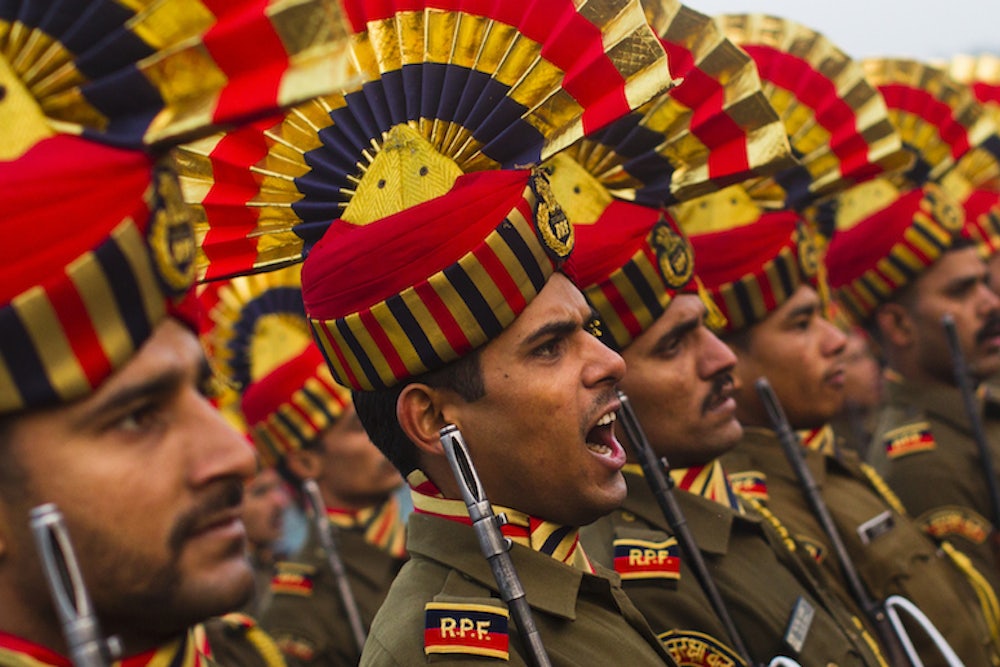Narendra Modi, who on Monday became the prime minister of India, is not generally considered to be a man of peace. Modi is perhaps best known for his controversial tenure as Chief Minister of the western state of Gujarat; in 2002, during that tenure, hundreds of Muslims were slaughtered in massive communal violence. (There remains a debate about whether Modi had any role either spurring on the killings or actively leaving people to their fair; at the very least, he didn't seem much bothered by mass murder.) Considering that India's most important foreign policy issue is its relationship with Pakistan, a Muslim country that was birthed after the 1947 partition of British India, there has been concern that Modi's election would lead to a worsening of an already volatile relationship. By inviting Pakistan's Prime Minister to his swearing-in ceremony, however, Modi surprised pessimistic observers and raised hopes that he could instead bring deeper economic ties to the region. Unfortunately, Modi is unlikely to improve India-Pakistan relations even if he wants to. And the reason has more to do with Pakistan than India.
It isn't exaggerating much to say that the conflict between India and Pakistan has implications for much of the world. It was Pakistan's fear of India that led it to support the Taliban government in Afghanistan, and nurture the many terrorist groups in the region. Both countries are nuclear-armed, and Pakistan is in a state of what might generously called instability. The two countries have fought several wars, often over the disputed territory Kashmir, most of which is controlled by the Indian military in brutal fashion. (Kashmir is India's only Muslim-majority state.) There have been several attempts to broker peace and increased trade between the two countries, and the current Pakistani Prime Minister, Nawaz Sharif, has stated numerous times that trade with India is a priority. Given that Modi is also known for his economic record, his friendliness to business interests, and an emphasis on growth, the question then arises of whether peace is in fact more likely with these two men in power.
When I was in Kashmir last month, more than one person I spoke with used the Nixon-to-China analogy. The thinking went that someone like Modi, known for his nationalist views and aggressive posture, might find it easier to negotiate peace with Pakistan. Indeed, it was the previous prime minister from Modi's right-wing Hindu party who arguably made the greatest peace strides of the last several decades. Many Kashmiris feel that life wasn't much better under more liberal governments, such as the Congress Party government that Modi defeated last month; Modi, at least, might have the political space to make magnanimous gestures.
Even if he were so inclined, however, Modi is surrounded by extreme hardliners; he has used Pakistan in the past to make alternately silly and demagogic remarks; and his constant nationalistic rhetoric is the type that often goes hand-in-hand with aggression on the world stage. As for the invitation to Sharif, it isn't clear whether it was made because Modi genuinely wants peace and increased ties, or because he wanted to cause Sharif political difficulties. (Sharif's decision to accept Modi's invitation was controversial in Pakistan.) If there is another Pakistani-supported terrorist attack, such as the one on Bombay in 2008, Modi would likely respond very forcefully, as the previous government did not. (If Pakistan were to do such a thing, India would be well within its rights to respond more severely. Still, it's not hard to imagine the situation spinning out of control.)
The mention of Pakistani aggression against India recalls the greatest barrier to peace, and it isn't Modi. Pakistan's powerful military has already halted Prime Minister Sharif's moves toward establishing closer ties with India. The military knows that its entire raison d'être is to oppose India, and that a peaceful, democratic, and integrated South Asia is not in its interest. With Modi in charge in New Delhi, the military has the perfect foil. Should Modi take steps toward peace, then, it is very possible that he will be spurned or ignored. (Or that his overtures will be met with state-sponsored violence.) This dismal story has been going on for decades, at least since Pakistani Prime Minister Zulfikar Ali Bhutto proved that he didn't have the ability or desire to make peace in the 1970s.
Pakistan's troubles, and the inability of its civilian government to deliver, are additional reasons for Modi to not anger his base. Even if he has more political room to make peace than previous governments did, he probably won't end up doing so. And the fault will not entirely be his own.
